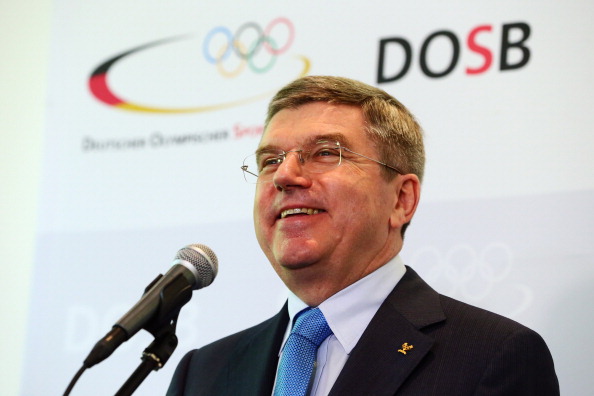Thomas Bach announced his candidacy Thursday for the International Olympic Committee presidency. It's not news, really, that he's running. The only issue was the timing.
Everyone in Olympic circles has been mindful for years that Bach has been interested in the top job. Indeed, he is, by most accounts, considered the front-runner for the presidency. Now comes the time to find out, with the election Sept. 10 in Buenos Aires, if being the front-runner, indeed announcing first, proves smart campaign strategy.
"I didn't want to keep other members in the dark any longer," Bach said at a news conference in Frankfurt, according to wire service reports. "I think it is the right time."
Bach would seem to meet most every qualification you could think of for the job. He is an Olympic gold medalist, in 1976 in fencing. He has been an IOC member since 1991. Without interruption, he has been a member of the policy-making executive board since 1996.
As chairman of the IOC juridicial commission, Bach -- a lawyer -- heads inquiries into most doping cases. He has chaired evaluations for cities bidding for Summer and Winter Games. He leads European television rights negotiations for the IOC. He is the head of the German national Olympic confederation, which goes by the acronym DOSB.
"With my management and leadership experience on the national and international level of sport, but also in business and politics and society, I am well trained for this great task," he said in a telephone call with reporters after the news conference.
Other probable candidates include Sergei Bubka of Ukraine, Richard Carrión of Puerto Rico, Ser Miang Ng of Singapore and C.K. Wu of Chinese Taipei. The deadline for declaring is June 10, three months ahead of the vote.
The winner will succeed Jacques Rogge of Belgium, who will have served 12 years. Rogge took over from Juan Antonio Samaranch of Spain.
The timing of Bach's announcement is most intriguing. Rumors had been circulating about who was going to get out there first -- and it was not Bach.
But then, suddenly, it was Bach, and it was him saying on the conference call, "This campaign for IOC president is not like a political campaign because the IOC members, they know all the candidates very well. They know what they are standing for, they know what they have contributed in the past to the Olympic movement and they know what they think."
He added, for emphasis, that it was "very much about convincing the members rather than about the public at large."
Step one, apparently, was what Bach did Wednesday in advance of Thursday's announcement.
Again, the timing -- most interesting.
He sent the members a letter -- he talked about it in Thursday's conference call -- that included a copy of the 10-page speech he presented in October, 2009, in Copenhagen at the Olympic Congress on the structure of the movement. That speech focuses on the notion of how sport must maintain autonomy in a complex 21st-century world. It refers to sources such as the philosopher Immanuel Kant. It prizes "respect, responsibility, reliability."
The headline on the speech: "Unity in diversity." That, Bach said Thursday, is the working mantra for his campaign as he "listen[s] even more carefully to the members" over the next several weeks before presenting a real-world plan for what he would do as president.
This microcosm highlights Bach in action. It also presents some of the challenges to his campaign.
Kant? Ten pages? Structure?
After years of anticipation -- that's the opening play?
There is an enormously delicate balance to be struck in this sort of campaign. The IOC presidency is a serious job, and the members have to know you are legitimate. At the same time, as Bach articulated in that conference call, this is a race that is something more like running for high-school class president than prime minister.
Once more, then, about the timing of all this -- so, so interesting. Was Bach being pro-active or hurriedly reactive in the belief that someone else might be setting the presidential agenda by being out first? Why else send out the preemptive strike of a (more than) three-year-old 10-page tome on the structure of the movement?
The skeptic would say that would simply buy time to put together his real manifesto.
In the meantime, what tone does this launch set for his campaign?
Whatever the motivation, always understand this: Bach is smart, capable, resourceful and formidable. His allies are all those things, as well.
An intriguing back story to Bach's campaign is that, for the moment, he would appear to be not only the single major western European candidate but, obviously, German.
The DOSB on Thursday issued a statement of support for him. From Berlin, Associated Press reported, German chancellor Angela Merkel "wishes him success."
Ordinarily, being European in the Eurocentric IOC might seem a huge advantage.
Then again, when one looks around at major international organizations, one is hard-pressed to find many Germans in charge. Until just a few weeks ago, the pope was German -- but now there is a new pope, and he is South American.
There are 35 Olympic sports. Only two have German presidents, modern pentathlon and luge. Neither is considered particularly influential.
Will Bach's German-ness prove an advantage, or not? Only time will tell.
In the meantime, Bach said Thursday he intends to run a clean campaign: "The campaign I am running is in favor of me. I am not running against anybody else. This is my leading consideration in what I will do these next four months."


